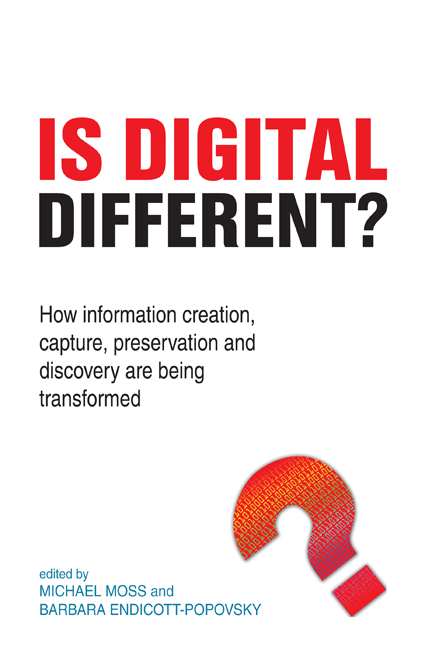 Is Digital Different?
Is Digital Different? Book contents
- Frontmatter
- Contents
- Contributors
- Introduction and acknowledgements
- 1 What is the same and what is different
- 2 Finding stuff
- 3 RDF, the Semantic Web, Jordan, Jordan and Jordan
- 4 Crowdsourcing
- 5 Pathways to integrating technical, legal and economic considerations in the design, development and deployment of trusted IM systems
- 6 Finding archived records in a digital age
- 7 Security: managing online risk
- 8 Rights and the commons: navigating the boundary between public and private knowledge spaces
- 9 From the Library of Alexandria to the Google Campus: has the digital changed the way we do research?
- Index
8 - Rights and the commons: navigating the boundary between public and private knowledge spaces
Published online by Cambridge University Press: 08 June 2018
- Frontmatter
- Contents
- Contributors
- Introduction and acknowledgements
- 1 What is the same and what is different
- 2 Finding stuff
- 3 RDF, the Semantic Web, Jordan, Jordan and Jordan
- 4 Crowdsourcing
- 5 Pathways to integrating technical, legal and economic considerations in the design, development and deployment of trusted IM systems
- 6 Finding archived records in a digital age
- 7 Security: managing online risk
- 8 Rights and the commons: navigating the boundary between public and private knowledge spaces
- 9 From the Library of Alexandria to the Google Campus: has the digital changed the way we do research?
- Index
Summary
Introduction
For the 21st-century archivist, access to all archival materials is going to be one of the most complicated and difficult tasks. In the pre-digital world the number of variables that the archivist had to deal with was significantly fewer than that which they are confronted with in the networked digital age. As a rule, records in the pre-digital world were only in material form and in the custody of an archival service or repository. Access was provided physically through a research or reading room – the researcher had to go in person to the records. This physical containment of the records, the archivist and the researcher (or information seeker) in the one space enabled the negotiation of rules, restrictions and obligations associated with access to archival material. This containment facilitated responsible access to material not intended for publication that could, for example, contain information relating to third parties – in particular, other people – or information pertaining to national security or information of commercial interest. The research room was a frontier where the public were able to interact with private knowledge, whether those materials were generated by governments (in Western democracies these are often known as ‘public records’), by businesses and organizations or by private individuals. In all cases these records have been kept by archives because they have been deemed to form a useful contribution to societal memory.
Differential access to records as determined, for example, by security or information privacy issues was managed through processes of restriction. This meant additional work for the archivist in preparing materials for release that might include redaction of third-party names or other information that might infringe the rights of others or compromise the role of government. In extreme cases highly secure research rooms were established purely to enable security-cleared individuals to access the most highly restricted materials. Similar conditions were set up for academic researchers wishing to consult medical or criminal records. With the passage of time the sensitivity of records diminishes. As a rule, for records over 100 years old, when the individuals concerned have died, commercial concerns are long passed and national security issues have become of historical interest only, access is less problematic. But, as we shall see, in a highly connected digital world even this rule of thumb is being challenged.
Information
- Type
- Chapter
- Information
- Is Digital Different?How information creation, capture, preservation and discovery are being transformed, pp. 171 - 188Publisher: FacetPrint publication year: 2015